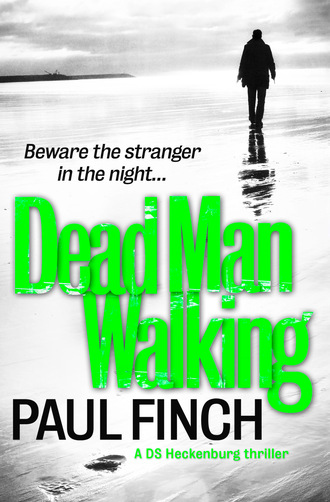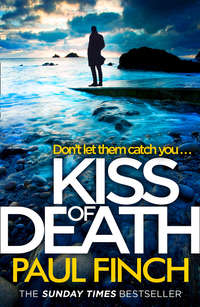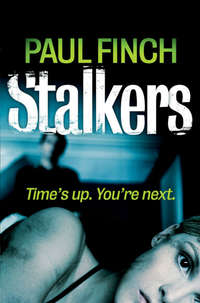
Полная версия
Dead Man Walking
Tara covered another fifty yards before she realised she’d been shot.
Initially it had been like a blow on the back of her shoulder. A hard one, of course. It had driven the wind out of her, but sheer terror kept her on her feet, kept her motoring forward. Now however, very suddenly, her strength was draining, an intense pain spreading through the top right quarter of her body. The arm itself had turned numb – she had no sensation below the elbow. Under her clothing, that whole side of her body swam with hot fluid.
‘Please,’ she mumbled as she lost the coordination of her limbs. Her balance was all out, her legs wobbling. She realised the darkness filling her eyes was no longer just the darkness of night and fog. When she tottered over the precipice, she could hardly be blamed, because she hadn’t even seen it.
Only vaguely aware she was falling, Tara spun downward for half a second, caroming outward from a jutting overhang made spongy by grass and rotted ferns, turning somersaults though icy emptiness, before hitting another shelf. This blow was phenomenal in its force, but again cushioned by sodden vegetation. Instinctively, she tried to grapple with it, but in mid-somersault all this did was wrench her left shoulder out of its socket and snap her humerus. In freefall again, she was engulfed by roaring, ice-cold water, and then hit by mud and rocks angled sharply downward, so that she slid on her back, until a heavy stone caught her feet and flipped her forward. Craggy edges tore at her ribs and rent her face, and then she was in mid-air again, descending through icy spume, the ear-pounding thunder of which overwhelmed all her senses.
Chapter 3
‘It came over the wire during the early hours,’ Mary-Ellen said to Heck as he checked into Cragwood Keld police station at eight the following morning.
It wasn’t a real police station. It was located at the west end of the village, on a residential cul-de-sac called Hetherby Close, and was no more than a detached, whitewashed cottage which had been adapted for police use about ten years ago. It had stood empty for much of that time, only opening a few months back as part of ACPO’s new rural crime initiative. A Cumbria Police noticeboard and an emergency phone stood on the front lawn, and wanted and mis-per posters decked its porch, but though it had a small front desk just inside the glazed front door – which was only open to customers temporarily, as Mary-Ellen had to patrol as well as answer call-outs – there was no facility to hold prisoners. The main office, where Heck and Mary-Ellen’s desks faced each other over about three yards of carpet space, was in the rear of the building, where a large bay-window overlooked what had once been a garden, but was now a covered storage area for rescue and road-traffic equipment.
Heck yawned as he sipped his cup of tea.
Mary-Ellen read on through the email. ‘Ambleside Mountain Rescue got a call from the owner of a campsite up at Watendlath. He’s a bit concerned about two girls – a Jane Dawson and Tara Cook. Seems they checked out of his site a day early, said they were spending the last night of their holiday at Stagshaw View, which is a B&B in Ambleside. Then they set off on foot. He reckoned they must have been planning to yomp it through the northern Pikes. Trouble is, that was before the fog came down. He was already a bit worried, because he’d been observing them during the week and reckoned they were the most unprepared backpackers he’d ever seen. Around ten o’clock, when he saw what a pea-soup we were getting, he called Stagshaw View and was told the girls had never arrived. Called again at midnight, and at two – got the same response. He had emergency numbers for them – their own mobiles, which they weren’t answering, and numbers for their parents back in Manchester. He got in touch with them too, but they hadn’t heard anything from their daughters and didn’t even know they were missing. Now of course, the mums and dads are panicking.’
‘To be fair, we don’t know they’re missing yet,’ Heck said. ‘Not for sure.’
‘They still haven’t shown up.’
‘If they got caught in the fog last night, they might just have camped.’
‘The campsite owner said they wouldn’t have stood a chance. Anyway, this fog’s scheduled to last another day and night at least.’
Heck glanced through the connecting door to the front desk, and beyond that through the glazed front door to the outside, which was still concealed by an opaque grey curtain. It would be pretty nightmarish up on the fells, especially for someone with no experience and poor equipment.
‘If they were headed to Ambleside from Borrowdale, that’s some distance from here,’ he said.
‘Yeah, but Mountain Rescue reckon it wouldn’t have been difficult for them to get turned around in the fog. They’d most likely have tried to come around Ullscarf and Greenup Edge, rather than go over the top. If they couldn’t see their hands in front of their faces by then, it would have been easy to mistake High Raise for Calf Crag. If they did, that would bring them over Pavey Ark and down through Fiend’s Fell to the east side of Witch Cradle Tarn. And in reduced visibility, well …’
She didn’t need to elaborate. Heck was no mountaineer, but he’d been up there just to acclimatise himself to the region, and Fiend’s Fell would be no laughing matter in fog. A notch in the White Stones crags, in appearance it was very dramatic – a vast, bowl-shaped grassland, windswept and strewn with boulders, and yet it ended abruptly, the land dropping precipitously away into the Cradle. There were various routes down from there – chimneys, ravines and even waterfalls – but these were strictly the domain of skilled and experienced climbers, not weekend adventurers.
‘Think we should get the launch out?’ Mary-Ellen asked.
‘Yeah.’ Heck finished his tea at a gulp. ‘I do.’
In times long past, further back than anyone living in the Cradle could remember, Cragwood Ho, at the north end of Witch Cradle Tarn, had been little more than a remote farming community. Back in the day, when no one even maintained the roads leading up to this place, let alone provided gas, electricity and hot water, it must have been a spectacularly isolated spot.
It certainly felt that way today. ‘The Ho’, as it was known locally, was three miles due north of ‘the Keld’, and connected by a single-track lane, which proceeded in a more or less straight line along the tarn’s edge, occasionally looping inward amid dense stands of pine and larch. Always to its left stood the steep, scree-cluttered slope ascending to Harrison Stickle. Though narrow, the road was usually bare of traffic during the off-season, and relatively safe. Though on this occasion, with visibility so appalling, progress was reduced to a torturous crawl. Veils of milk-white vapour reduced their vision to two or three yards, while even full headlight beams failed to penetrate more than a foot or so beyond that.
‘Anyone lost on the fells in this is gonna be in real trouble,’ Mary-Ellen said, zipping her black anorak. The Land Rover was warm inside, but it had a chilling effect just peering into the shifting blankness.
‘Yep,’ Heck muttered.
‘Especially if they’re new to the area.’
He nodded again. The Pikes were not hugely extensive, but they were dominant features even in the dramatic heart of the Lake District; colossal granite pyramids, with deep, wooded glens knifing through the middle of them, and fast becks tumbling and cascading down their rolling, rocky slopes. A playground for the fit and energetic, certainly; but a trackless region too, which required knowledge and athleticism to navigate on foot. And now, of course, something else had occurred to him.
‘I don’t want to overstate the importance of this, M-E, but just after midnight last night I heard what sounded like gunfire.’
She glanced sidelong at him as she drove. ‘Where?’
‘Up in the fells.’
‘Any particular direction?’
‘Impossible to say. It was only one shot too, so … I don’t know, I might have been mistaken.’
Mary-Ellen pondered this.
‘You didn’t hear anything?’ he asked.
‘Nah. Hit the sack well before then. You know me. Sleep like a log.’
They cruised on at a steady six miles per hour, though even then it felt as if they were taking a chance. When a stag emerged from the fog in front of them, they had to jam on the brakes. The majestic beast had simply stepped from the vapour, little more than an outline in the misted glow of their lights, just about identifiable by its tall profile and the handsome spread of its antlers. It stood stock-still for a second, and then galloped off into the roadside foliage.
‘Probably the last living thing we’ll see out here,’ Mary-Ellen commented, easing back onto the gas.
‘Don’t know whether to hope you’re right or wrong,’ Heck replied.
He’d often heard the saying ‘no news is good news’, and couldn’t think of any dictum more worthless. At present, for example, they had almost nothing to go on. Before setting out, he’d checked with Windermere Comms, and had been given an update, which was mainly that there was no update, though they’d also been informed that, owing to the conditions, effective Mountain Rescue operations would be difficult – they might even be suspended – and it was certainly the case that no RAF helicopters could go up. Despite everything, it was deemed unlikely the two girls would have strayed from their intended route as far west as the Cradle, which was kind of encouraging, though the downside of this was that no extra bodies were being sent over here to assist. In the event there was a problem, Heck and Mary-Ellen were pretty much on their own.
Perched on the northernmost tip of Witch Cradle Tarn, Cragwood Ho was the archetypical Lakeland hamlet. Of its four houses, only two were occupied full-time. The empty units comprised a stone-built holiday let, once a working stable but still in the ownership of Gordon Clay, a farmer over Coniston way, and at this time of year almost always closed up, while the other, another former farm building, was now used as a second home by a family from south Lancashire. Aside from the Christmas season, this second house also stood unused during the winter months. Both of these premises were located on the west side of Cragwood Road. The hamlet’s only two permanent residents lived on the east side of the road, next door to each other, right on the tarn’s shoreline.
Cragwood Road itself ended in Cragwood Ho. As soon as it passed through the small clutch of houses, it ascended a few dozen yards into a gravelled parking area, where all further progress by normal vehicle was blocked by a dry-stone wall with a gate and a stile. Beyond that, a treacherous footway, the Cradle Track, snaked its way up into the Pikes; at its lower section this was just about wide enough for vehicle use, but most of the time the gate was kept barred. The car park was usually full during the spring and summer, walkers and climbers viewing this as the most immediate access to the Central Lakes massif, while the early autumn saw no shortage of visitors either. But at present, as Heck and Mary-Ellen coasted up into it, the Land Rover’s tyres crunching to a halt against its rear wall, they appeared to be alone.
Visibility was still negligible. They couldn’t even see the entirety of the car park. Further wafts of milky vapour flowed past as they climbed out, pulling on their gloves and woolly hats. As usual, Mary Ellen was in uniform, while Heck, as a CID officer, wore his regulation sweater, canvas trousers and walking boots, though on a day like today both also pulled on hi-viz waterproof overcoats with POLICE stencilled across the back in luminous letters.
‘Quiet as the bloody grave,’ Mary-Ellen said, her voice echoing eerily.
Heck took the loudhailer from the boot. ‘At least if these lasses are stuck somewhere nearby, it shouldn’t be difficult getting them to hear us.’
They set off down the side path which dropped steeply from the car park, and led along the front of the two houses on the water’s edge.
The house on the right was called Lake-End Cottage, and its inhabitant was a certain Bill Ramsdale, a onetime married man and academic who now, in his mid-fifties, had become a reclusive loner and apparently, a writer, though Heck had never seen his name in a bookshop, either online or in the real world. His house was a small, scruffy cottage, the downstairs of which was almost entirely taken up by his study, but it was also surrounded by acres of untrimmed lawn, which rolled impressively down to the waterside and terminated at a private jetty. Given the usual prices in the Lake District, such a plot ought to have cost him a pretty penny. Whether he was rich or poor, Ramsdale was notoriously ill-tempered about his privacy. Twice he’d been spoken to by Mary-Ellen for showing a belligerent and even threatening attitude to hikers who’d strolled down across his land to the tarn’s edge, unaware they were trespassing thanks to most of his perimeter wall having collapsed and his grass being overgrown.
The second resident, Bessie Longhorn, was an altogether more likeable sort. Just turned twenty, she was a little rough around the edges – only poorly educated, and thanks to a lifetime of semi-isolation in the Cradle, minus a fashion sense or any real knowledge about youth culture in general – but she was a friendly kid and always eager to please, especially when it came to Heck. Bessie’s cottage, formerly a farmhouse and so considerably larger than Ramsdale’s, with numerous run-down outbuildings attached, belonged to her mother, Ada, who was only sixty-five but in poor health and residing in sheltered accommodation in Bowness. For obvious reasons, Ada considered it important that Bessie get used to being independent, even though this meant the younger woman didn’t get to visit her old mum as often as they’d both like. For all that, Bessie was a happy-go-lucky character, who filled her time doing odd jobs for the residents of Cragwood Keld at the other end of the tarn. She’d once offered to help Ramsdale by mowing his unruly lawn, but the surly neighbour had responded by telling her to ‘keep the fuck away’, so now Bessie, who was reduced to tears quite easily, did exactly that.
Perhaps the task she prized most highly was minding the keys to the police launch. This was convenient for all concerned because the boathouse in which the launch was kept was part of Bessie’s property. Approximately the same size and shape as a suburban garage, the boathouse was propped up on stilts and in a generally dilapidated condition, its timbers tinged green by mildew – but it was better than nothing. The cement path leading down to it crossed the middle of Bessie’s neatly-trimmed back garden, so it was always necessary to call on her first.
They halted before walking up Bessie’s front path, and looked towards Ramsdale’s house, his presence indicated by a very dull glow from one of its windows and the pale smoke issuing from its chimney.
‘Wouldn’t have liked to be one of the two girls if they came looking for help and knocked on that miserable sod’s door,’ Mary-Ellen said.
‘Neither would I, now you mention it,’ Heck replied thoughtfully. ‘But it’s a good point.’ He veered back along the road and down the path towards Ramsdale’s house. ‘Go and check with Bessie, would you?’
‘Who the fuck is it?’ came a muffled response to Heck’s full-knuckled knock.
‘Detective Sergeant Heckenburg, Mr Ramsdale,’ Heck replied. ‘Cragwood Keld police station. Can you open up please?’
What Heck always thought of as a guilty silence followed. Whenever you arrived at someone’s house and announced yourself as a copper, it was the same – whether it was some flash manse in the suburbs, or a scumhole bedsit in the urban badlands. Everyone, it seemed, no matter what their station in life, had some itsy-bitsy secret that occasionally kept them awake at night.
A chair finally scraped on a stone floor and heavy feet thudded to the door. It opened, but only by a few inches, and Ramsdale’s big frame filled the gap. He wasn’t just burly, he was tall – at least six-three – and permanently dishevelled, with a head of shaggy, iron-grey hair and an unkempt grey beard, all of which when combined with his tarnished earring, had a distinct air of the scuzzy. Today’s attire did little to offset this: a shapeless white t-shirt stained by tea or coffee, baggy stonewashed jeans torn at the knees, and a pair of floppy, moth-eaten slippers. He also smelled strongly of tobacco. And it wasn’t just the householder who was a less than wholesome sight. Heck caught a glimpse of the room behind. There was a desktop computer on a table and a wall of lopsided shelving crammed with buff folders, while the floor was buried under a mass of disordered paperwork.
‘How can I help, detective?’ Ramsdale asked, regarding Heck over the tops of his reading glasses. His anger had abated a little, but his tone implied hostility.
‘Just a quick one really, Mr Ramsdale. We’ve got two people missing in the Pikes.’
‘You don’t say.’
‘You’ve heard about it already?’
‘No, but it’s the silly season, isn’t it? Same thing every year. First bit of really bad weather and all the idiots come out to play.’
‘Yeah, well … we’re pretty worried about these two. Their names are Jane Dawson and Tara Cook. Young girls, both aged twenty-four. They were last seen yesterday, rambling south from Borrowdale. As far as we know, they weren’t planning to come down into Langdale, but they could easily have got lost up on the tops. Just wondered if you’d seen or heard anyone coming down the Cradle Track late last night?’
Ramsdale remained blank-faced. ‘I’m hardly likely to, am I?’
That was a fairer comment than it sounded. The walls in these old farm cottages were several feet thick, and at this time of year all doors and windows would be closed, while both Ramsdale’s house, and Bessie’s house next door, were a good fifty or so yards from the parking area at the foot of the Track.
However, Ramsdale’s scathing tone provoked Heck into prolonging the interview. ‘They’d have had to be well off-course, I suppose …’
‘That could never happen, could it?’ Ramsdale scoffed. ‘Bunch of kids left to their own devices. Fucking up.’
‘These weren’t kids, sir.’
‘Oh, excuse me. Twenty-four years old. I bet they’ve seen everything.’
‘It just struck me that if they did get lost and come down this way, it would be the middle of the night … so they might have knocked on the door, asked for shelter.’
‘Nobody did. I just told you.’
‘Maybe a drop of tea … to warm them up?’
‘Sorry.’
‘Or just to ask directions. I’m sure even you wouldn’t have had a problem providing those, Mr Ramsdale.’
Ramsdale smiled thinly. Despite his blustery exterior, he was no bully; he didn’t reserve his anger for those who couldn’t fight back. But he was intelligent enough to know not to get on the wrong side of the Cumbrian Constabulary. ‘Like I say, no one came here. But if you want to do a thorough job, Detective Heckenburg, it might be worth having a word with Longhorn next door.’
‘That’s already in hand, Mr Ramsdale. Just out of interest … you’re not going away anywhere are you?’
Ramsdale looked puzzled. ‘No.’
‘Good.’
‘Why?’
Heck shrugged as he backed away along the path. ‘We’ve got to stay on high alert until these girls are found. That means maintaining contact with all persons of interest.’
‘Persons of interest?’ Ramsdale’s cheeks reddened. ‘Are you trying to be funny?’
‘Do I look like I’m laughing, Mr Ramsdale?’
The tall figure in the cottage doorway diminished into the fog as Heck walked back to the road. There was a thumping CLAP! as the door was slammed closed.
Heck turned in along the next path, and found Mary-Ellen and Bessie Longhorn standing by the side of the house, the exterior of which – mainly whitewashed pebble-dash – had been more recently maintained than Ramsdale’s.
‘This is a right how’d-you-do, isn’t it, Sergeant Heckenburg?’ Bessie said with her characteristic froglike grin. She was about five foot seven and of stocky build, though much of this was running to plump, with a mottled pink complexion and an unruly thatch of thinning gingery hair. As usual when outdoors, she wore an old duffle-coat and a shapeless chequered hat, which Heck suspected might have enjoyed a former existence as a tea-cosy. An electric torch was clutched in Bessie’s mittened hand.
‘Sure is, Bessie,’ Heck replied. ‘You got that right.’
Her cheeks turned a ruddy hue at the sound of her own name on Heck’s lips. It was Mary-Ellen who’d first concluded that their local handywoman liked the ‘tall, dark-haired detective sergeant’, and though it was something he hadn’t noticed before then, the impression was now impossible to shake.
‘I’ve got the keys for you,’ Bessie said, jangling said articles as she turned and led them primly down the cement path, the angled outline of the boathouse materialising ahead of them.
‘Bessie didn’t see or hear anything,’ Mary-Ellen said.
‘Dead quiet round here last night,’ Bessie said over her shoulder.
‘Mr Ramsdale didn’t hear anything either,’ Heck responded.
‘It’s a bad business, isn’t it, Sergeant Heckenburg?’ Bessie chattered as he unlocked the corrugated metal door. ‘If these lasses haven’t come down from the fells by now, something bad must have happened to them.’
Heck didn’t initially reply. There was something vaguely disturbing about that simple and yet undeniable logic.
‘Lots of places up there where they could just have got lost, Bessie,’ Mary-Ellen said. ‘It’s not necessarily bad news.’
The door creaked open on the boathouse’s fetid interior. Bessie lurched in first, switching on her torch. The Witch Cradle Tarn police launch was actually a small outboard now adapted for official purposes. Despite it almost never needing to be used, it was old and in degraded condition, its hull scraped, its metalwork tarnished. Only its recently applied turquoise and yellow Battenberg flashes looked new. For all this, it was more than adequate to take them across the tarn to the east shore, which the two missing girls, if they’d followed the route Heck and Mary-Ellen suspected, might well have descended to, or in the worst-case scenario, could have fallen down to. The boat currently sat between two concrete piers, normally in about four feet of mucky brown water, though at present, owing to the heavy autumn rain, the tarn’s level was significantly higher.
Bessie handed the keys to Mary-Ellen, and walked to the end of the starboard pier, where she used a crank-handle to raise the roll-up door at the entry-port for the boat.Mary-Ellen climbed aboard, taking the wheel. Heck untied the mooring ropes, then jumped aboard as well, and the craft rumbled to life.
‘Just give us a knock when you get back, so I can lock up,’ Bessie called as they chugged out into the chill, foggy air.
‘No probs, Bessie!’ Heck called back, to which she no doubt blushed again.
With the tarn already having risen to its winter levels, the normal straight channel they’d follow for about a hundred yards through dense bulrushes before reaching open water was almost hidden. Only the tips of browning vegetation were visible, which made it considerably more difficult to steer along, especially in this monotone gloom. The last thing they needed was to get ropes of rotted herbage meshed around their propeller. But as with so many outdoor pursuits, Mary-Ellen was more than a dab hand. She stood at the helm, keeping them on a dead-straight course as they processed forward. If visibility had been bad on land, it was even worse over frigid water. Within seconds of solid ground disappearing behind them, they found they could see no distance in any direction. The outboard’s headlights were already activated, but Heck turned on the prow spotlight as well. This normally drove a broad wedge of luminescence for several hundred yards, though on this occasion it revealed nothing and in fact was reflected back on them with interest. He turned the spot on its pivot, but wherever it pointed there was a glaring backwash from the semi-liquid whiteness, every tendril of fog, every twist and spiral glowing as if phosphorescent.







